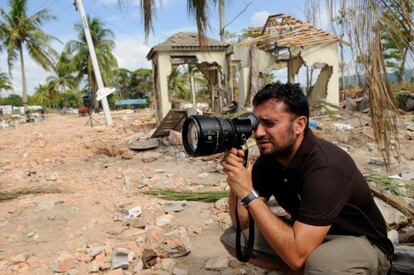Bayona the bounty hunter
Director awarded National Cinema Prize for the success of ‘The Impossible’

From surprise to disbelief, and then to happiness. Those were the three stages that Juan Antonio Bayona went through earlier this week when he heard the news that he had been chosen as the winner of this year's National Cinema Prize.
Aged just 38, the director felt a bit calmer once it was clear that he was not receiving it for his whole career, but rather a specific work he made the year before. The Impossible, which stars Naomi Watts and Ewan McGregor, became the highest-grossing Spanish film ever, and dares to tell the real-life tragedy that Spaniard María Belón and her family lived through, when they were caught up in the tsunami that devastated parts of Indonesia, Thailand, Malaysia and Sri Lanka in 2004.
"Nobody is going to finish off Spanish cinema," Bayona said after hearing the news. For him the best thing about the prize is the recognition it gives to the Spanish film industry in general. "I feel very proud of how the film worked beyond our borders, but the most important thing is having been able to convince people from here that we are capable of making very good cinema and demonstrating that we have an industry with excellent technicians, whom we have to take care of and nurture," he said.
The director of The Orphanage said the award — which carries a cash prize of 30,000 euros and will be given to him during the San Sebastián Film Festival in September — would help him face the future at a difficult moment. "The tough thing is supporting yourself. This prize is a real push to continue," he said, before contemplating whether The Impossible could still get made in today's climate. "I'm not very sure that it would have found financing. The biggest thing was that we could film the story in the same place in which the tragic events took place."
The tough thing is supporting yourself. This prize is a real push to continue"
Bayona has just jumped into the world of television for the first time with a series produced by US channel Showtime and British director Sam Mendes. In the coming months he will be staying in Dublin, where he will direct the first two of the eight episodes currently planned for the series, which he describes as a "psychosexual drama with fantasy elements."
At the same time, he will also prepare his third feature, about which he is not giving away a thing. "I'm debating between a couple of stories, but I hope that I will already be directing it in 2014."
The jury that awarded Bayona the national prize was headed by the director general of the National Cinema and Audiovisual Arts Institute (ICAA), Susana de la Sierra. It described The Impossible as "a vital and outstanding project, especially in a difficult economic context.
"Bayona is a filmmaker who has raised the profile of our cinema, both within and outside of Spain," it added.
"He represents a new generation of creators of big international projects, and has been recognized by the critics and the public alike."
The Impossible (2012) earned 14 nominations at the 27th edition of Spain's Goya Film Awards in 2013, taking home five, including Best Director for Bayona.
The filmmaker, who trained at the ESCAC Catalan film school, made his debut with The Orphanage — a tale of childhood horrors produced by Mexican Guillermo del Toro and starring Belén Rueda — in 2007. The film received a 10-minute standing ovation after its screening at the Cannes Film Festival and earned Bayona the Goya award for Best New Director in 2008.
Tu suscripción se está usando en otro dispositivo
¿Quieres añadir otro usuario a tu suscripción?
Si continúas leyendo en este dispositivo, no se podrá leer en el otro.
FlechaTu suscripción se está usando en otro dispositivo y solo puedes acceder a EL PAÍS desde un dispositivo a la vez.
Si quieres compartir tu cuenta, cambia tu suscripción a la modalidad Premium, así podrás añadir otro usuario. Cada uno accederá con su propia cuenta de email, lo que os permitirá personalizar vuestra experiencia en EL PAÍS.
¿Tienes una suscripción de empresa? Accede aquí para contratar más cuentas.
En el caso de no saber quién está usando tu cuenta, te recomendamos cambiar tu contraseña aquí.
Si decides continuar compartiendo tu cuenta, este mensaje se mostrará en tu dispositivo y en el de la otra persona que está usando tu cuenta de forma indefinida, afectando a tu experiencia de lectura. Puedes consultar aquí los términos y condiciones de la suscripción digital.









































